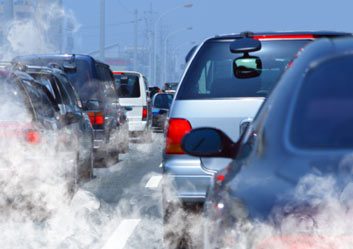News: How pollution impacts the brain
It’s bad enough that Canadians spend the equivalent of 12 days a year commuting, but all that time spent in

It’s bad enough that Canadians spend the equivalent of 12 days a year commuting, but all that time spent in traffic jams and smog might have more of an impact than you think. Researchers are now linking traffic fumes to cognitive problems and higher rates of autism.
A recent Wall Street Journal piece reported that the tiny carbon particles in exhaust (already linked to respiratory problems and heart disease) are even worse than initially thought. Medical experts are now analyzing the far-reaching impact of traffic fumes on brain health.
Dr. Heather Volk, a medical epidemiologist at USC’s Keck School of Medicine and her colleagues reviewed birth records of children born within 1,000 feet of a major road or freeway in three famously congested cities: LA, San Francisco or Sacramento. They found these children were twice as likely to have autism (even when accounting for factors such as ethnicity, gender, maternal age, tobacco smoke and education).
“Based on our data, it looks like air pollution might be a risk factor for autism,” Dr. Volk told the WSJ, but added that, “it is too soon for alarm.” The findings published in Environmental Health Perspectives are a start at understanding how car pollution is affecting health, but can’t be mistaken as the sole cause of autism.
Other recent studies out of the Netherlands are pretty alarming, too. They show that breathing street-level fumes for just half-an-hour “can intensify electrical activity in brain regions responsible for behaviour, personality and decision-making.”
– Marlene Rego, web editor, besthealthmag.ca
Related:
‘ No more road rage!
‘ 10 ways to simplify family travel
‘ News: Canadian air quality ranks third




